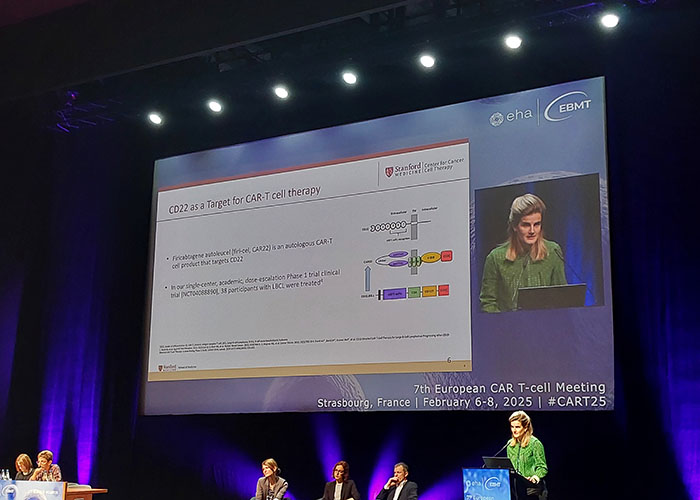
CD22 has emerged as a promising target for CAR T-cell therapy in relapsed/refractory B-cell malignancies, particularly when CD19-targeted therapies fail.
Here's an overview of its clinical potential and challenges:
Efficacy Across Blood Cancers
CD22 CAR T-cells show significant activity in multiple B-cell malignancies:
B-cell acute lymphoblastic leukemia (B-ALL):
- 68% complete response rate (CR) with CD22 CAR T-cells alone
- 90% CR when combined with CD19-targeting (dual CAR T-cells)
- Median relapse-free survival: 6 months post-CR
Large B-cell lymphoma (LBCL):
- 47% CR rate with CD19/CD22 dual-targeted therapy
- 100% CR in early trials for CAR19-refractory cases (n=3)
Non-Hodgkin lymphoma (NHL):
- 64% CR with CD22 monotherapy

#CART25 - European hematology conference in Strasbourg, France.
Mechanistic Advantages
- Salvage therapy: Effective in 70% of CD19 immunotherapy-resistant B-ALL cases
- Antigen retention: CD22 expression remains high even after CD19 antigen loss
- Dual targeting: CD19/CD22 combination reduces antigen escape risk (93% MRD negativity vs 86% with CD22 alone)
Safety Profile
CD22 CAR T-cells demonstrate favorable toxicity metrics:
Cytokine release syndrome (CRS):
- Severe (grade ≥3) in only 6% of cases
- 86% experienced grade 1-2 CRS
Neurotoxicity:
- Severe events in 3% of patients
- Transient symptoms in lymphoma trials
Key Challenges
Relapse mechanisms:
- 40-69% relapse rates within 6-24 months
- Associated with CD22 antigen density reduction (p=0.02)
Manufacturing complexity:
CD4/CD8 T-cell selection improves feasibility but increases inflammatory toxicities
Clinical Progress
- FDA Breakthrough Therapy designation for CD22 CAR T-cells in LBCL (2022)
- Ongoing phase 1 trials testing dose escalation (up to 1×10^6 CAR+ T-cells/kg)
- Novel toxicity mitigation strategies using anakinra for HLH-like manifestations
While not yet FDA-approved, CD22-directed CAR T-cells represent a critical second-line option for CD19-immunotherapy failures, with response rates comparable to first-generation CD19 therapies in treatment-refractory populations. Ongoing research focuses on improving persistence through optimized lymphodepletion regimens and combination approaches.
Publication date: March 2025
Sources:
pmc.ncbi.nlm.nih.gov
nature.com
pubmed.ncbi.nlm.nih.gov
ashpublications.org
cancer.gov
news-medical.net
jitc.bmj.com
ajmc.com







